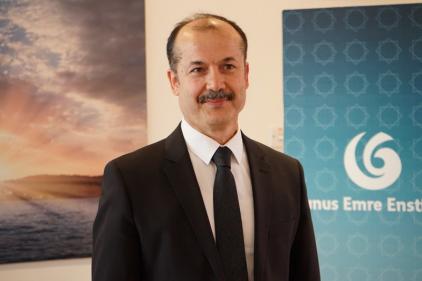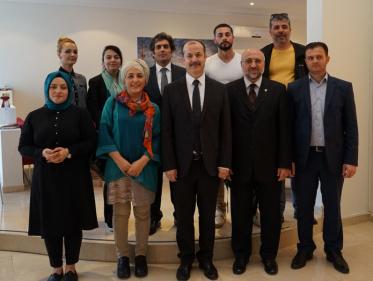Prof. Dr. Ateş: Turkey develops an alternative model
Yunus Emre Enstitüsü President Professor Dr. Şeref Ateş who participated in "Turkish Culture Days" activities in Doha, made statements to press members about Enstitü's activities and the struggle with FETÖ abroad.
Giving information about their efforts to explain the world what happened during the coup attempt on July 15th, Ateş said the following: "We were the first to intervene in the coup attempt in Turkey. We made contacts with foreign press, academic circles and politicians to inform them about the military coup attempt taking place in Turkey and sent texts in English describing that the coup attempt was illegal and was undoubtedly staged by FETÖ supporters against the Turkish Republic, and on July 16 informed the whole public through our directors, maybe even before the press.”
Marking that Yunus Emre Enstitüsü inaugurated in Ankara on 2009, was founded as a public institution, Ateş spoke as follows: “Yunus Emre Enstitüsü was established in order to carry out cultural diplomacy activities Westerners carry out for 50-100 years through institutions such as the Goethe Institute and the British Council. The executive body of the foundation is Yunus Emre Enstitüsü. Since its activities are organised abroad, cultural centres were primarily established the first centre in Sarajevo and the second in Albania."
Noting that Enstitü centres have been opened in Vienna, Europe, Germany, France, Japan, Malaysia and America as of 2013, Ateş said: "A centre will be opened in Brazil and two other in Pakistan. The primary goal of the centres is to introduce Turkey. And making the world familiar with arguments of Turkey by introducing Turkish language and culture. To present Turkey's arguments concerning foreign policy as well as its power and potential. It employs cultural diplomacy in expressing these.”
"In a year we will form a Janissary band in Japan"
Emphasizing that different segments take interest in activities of the Enstitü, Ateş said, "We wish the opinions on Turkey to become more positive. Our difference from government institutions is promoting Turkey in a more civil, more critical, more neutral way." .
Şeref Ateş stressing that each country works in accordance with their respective culture, history and values, said, "For example, Turkish learning activities are more intensive in the Balkans. We have carried out the 'My Preference Turkey' project we initiated in the Balkans for 5 years. More than 10 thousand students currently learn Turkish in secondary schools in Bosnia-Herzegovina."
Adding that they establish academic and artistic collaborations in European countries, Ateş continued as follows:
"The culture of Japan is about 'few people, a lot of work.' A Janissary Band under the General Staff previously visited Japan, and held a parade on a main street in Tokyo. A Janissary show was held. Japanese people loved it. But because it is very difficult for us to send an air-plane full of Janissary band to Tokyo just for an hour, we agreed with the General Staff to send one member of the band biweekly. We leave that instrument at the music school there, we teach how to play that instrument to form a Janissary band within a year. "
Ateş explained that the Japanese held aerial shoots of Istanbul and created images of Turkey for 3-dimensional glasses, and that through technology, people can see Turkey .
"We were the first to intervene in the coup attempt abroad"
Referring to the coup attempt on July 15th Yunus Emre Enstitüsü President Ateş said:
"While a coup attempt took place on the night of July 15th we were on the streets in Ankara as we planned July 16th . We never shared this with the press. On the morning on July 16th, we contacted all Enstitü directors abroad even before Turkey woke up, and drafted texts in English for their countries explaining the coup attempt in Turkey. We were the first to intervene, saying 'Get in contact with the press, academic circles, politicians there'. We informed them about the military coup attempt taking place in Turkey and sent texts in English describing that the coup attempt was illegal and was undoubtedly staged by FETÖ supporters against the Turkish Republic, and informed the whole public through our directors, maybe even before the press.”
Noting that they made the planning during the night, Ateş said, “We did this in 45 Enstitü centres, and it also had an effect. Journalists from Italy, South Africa called us on the 16th. We established contact for most before they reached you. Because there was a sense of surprise in Turkey. So this also demonstrated what these centres can achieve at such a critical time. So we were the first organisation to intervene on July 16th .”
Stating that Enstitü personnel are in contact with opinion leaders, university professors and students in their respective countries, Ateş continued as follows:
“The main function of Yunus Emre Enstitüsü is being able to use this communication network at critical moments and to communicate these arguments in favour of Turkey to people through this network. We used such an informing method on the 16th. On the 17th , Fetullah Gülen made his first statement and he mentioned Yunus Emre Enstitüsü twice in his speech. We irritated so much that, he said twice with contempt that 'They established an Enstitü named Yunus Emre but they are not successful although they carry out so many operations.'"
Ateş emphasized that Enstitü's operations bother leader of FETÖ terrorist organisation Fetullah Gülen, and said, "The information he received made him very upset and he was disturbed that he only talked about Yunus Emre Enstitüsü from Turkey.”
Şeref Ateş, stating that FETÖ betrayed Turkey with the money of Turkish people, gave the following information:
“Of course this is a cultural feature of the people. The public supported this structure thinking 'They support my culture, and promote my faith'. There is a positive perception towards Turkey abroad. There is extraordinary expectation from Turkey especially in countries where people are Muslims. And this organisation exploited this positive image of Turkey and operated with these expectations. Therefore, when Yunus Emre Enstitüsü was founded, we became a major disturbance. Since other institutions cleaned up their acts after July 15th, we completely changed Yunus Emre Enstitüsü in 2014 following the event on December 17th. We changed all our personnel at that time.”
Noting that their main objectives are Turkish and Turkish culture, Ateş said, "Therefore, we do not limit ourselves to teach Turkish and present the elements of Turkish culture at a certain place. In the world, there is a need for Turkey's success because Turkey is developing an alternative model. Despite all the international pressure, it continues to develop. In face of all internal and external conflicts, we maintain the culture of cohabiting and we must explain this model to the whole world.”




